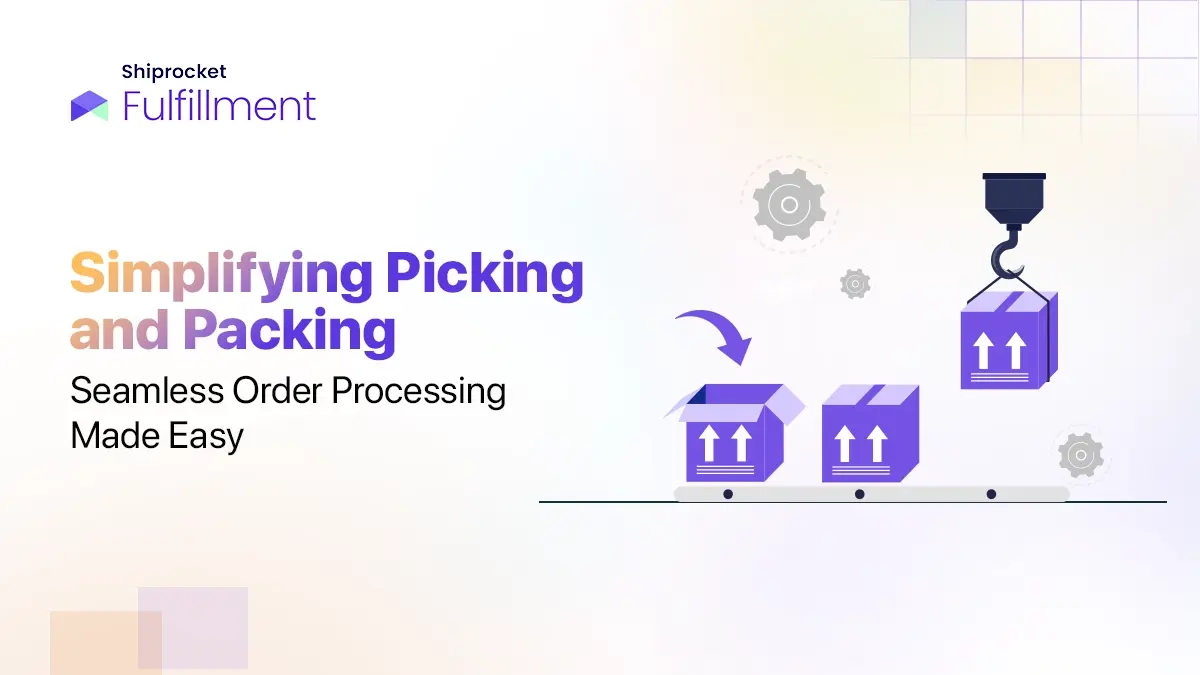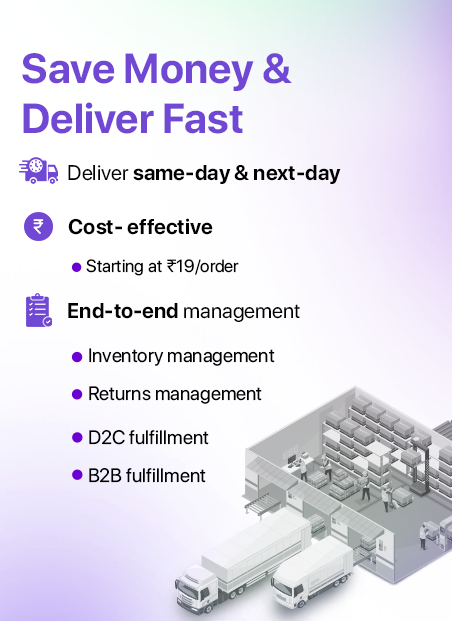Enhancing Supply Chain Efficiency: Optimising Logistics Operations for Success
The success of the eCommerce industry is determined by its on-time, accurate, and uninterrupted delivery of orders to online buyers. Hence, the end-to-end process and income-generating capacity of a business depend on the efficiency of its logistics operations and supply chain. Thus, every business should focus on adding value to their services by successfully managing logistics operations. Service providers in logistics operations help businesses enhance their supply chain efficiency with innovative strategies. This article explores the concept of logistics operations, highlights their significance in the eCommerce industry, delves into key processes involved, and presents a comprehensive set of features to optimise logistics operations and enhance supply chain management.

What are Logistics Operations?
Logistics operations encompass the intricate processes involved in connecting manufacturers, suppliers, or points of origin of orders/products to buyers by utilising the appropriate transport vehicles and documenting the transfer of goods or deliveries to the end-user or buyer. It involves the comprehensive management of goods, information, and resources, facilitating their journey from the point of origin to their final destination. These operations include the following activities-
- Procurement
- Inventory management
- Storage, transportation
- Order fulfillment
- Distribution
The core purpose of logistics operations is to ensure the efficient movement of goods, minimise transport hours, and achieve timely deliveries, ultimately enhancing customer satisfaction.
Importance of Logistics Operations in eCommerce
Logistics operations are the foundation of a successful eCommerce business. Here are the key reasons why logistics operations are crucial in the eCommerce industry:
1. Timely Order Fulfillment: Efficient logistics operations enable businesses to process and fulfill customer orders swiftly and accurately. This leads to enhanced customer satisfaction, increased repeat purchases, and a positive brand image.
2. Optimal Inventory Management: Effective logistics operations ensure optimal inventory levels by leveraging advanced demand forecasting techniques, inventory optimisation strategies, and efficient replenishment practises. This minimises stockouts, reduces carrying costs, and maintains a healthy cash flow.
3. Cost Optimisation: Well-executed logistics operations help businesses optimise costs associated with transportation, warehousing, inventory holding, and order processing. By streamlining processes, consolidating shipments, and optimising routes, businesses can achieve cost savings and improve overall profitability.
4. Scalability and Flexibility: Robust logistics operations provide businesses with the agility and scalability required to handle increased order volumes, seasonal fluctuations, and market expansions. It enables businesses to adapt seamlessly to changing customer demands and market dynamics.
5. Customer Experience: Logistics operations directly impact the customer experience by ensuring on-time deliveries, accurate order tracking, and efficient return management. A positive customer experience builds trust, fosters customer loyalty, and drives business growth.
By managing inventory, coordinating transportation, and streamlining order fulfillment processes, logistics operations enable eCommerce businesses to meet customer expectations, drive sales, and stay competitive in the fast-paced online marketplace.
IV. Key Processes in Logistics Operations
Logistics operations involve several key processes that are critical for effective supply chain management. These processes include:
A. Advanced Inventory Management: Implementing advanced inventory management practises, such as demand forecasting, SKU rationalisation, and ABC analysis, ensures optimal stock levels, reduces inventory holding costs, and improves overall inventory accuracy.
B. Automated Order Fulfillment: Embracing automation in order fulfillment processes streamlines operations, reduces errors, and improves efficiency. Automated order routing, picking, packing, and labelling enable faster processing and dispatch, enhancing order accuracy and customer satisfaction.
C. Warehouse Management Systems (WMS): Utilising sophisticated warehouse management systems streamlines warehouse operations, optimises space utilisation, and improves order picking and put-away processes. WMS provides real-time visibility, automates tasks, and facilitates effective resource allocation.
D. Real-Time Data Analytics: This is one of the core features for the optimisation of processes. Using real-time data analytics, businesses gain intelligence that guides their decision making. insights to drive informed decision-making. Features include –
- Analysing data for KPIs
- Delivery performance
- Customer feedback
- Identification of bottlenecks
Thus, optimisation of processes enhances supply chain efficiency and leads to success.
E. Efficient Transport Management: Implementing efficient transport management practices, includes-
- Route optimisation
- Carrier selection
- Shipment consolidation
- Reduces transportation costs
Thus, optimisation of logistic operations improves delivery speed and minimises environmental impact.
F. Sustainable Practices: Incorporating sustainable practises, including eco-friendly packaging materials, optimised packaging sizes, and greener transportation options, not only reduces carbon footprint but also aligns with the growing customer demand for environmentally conscious businesses.
V. Comprehensive Features to Streamline Logistics Operations
A. Integrated Order and Inventory Management: A robust logistics solution should offer seamless integration with eCommerce platforms, enabling automated order imports, real-time inventory updates, and efficient order processing.
B. Advanced Warehouse Management: A sophisticated warehouse management system should optimise space utilisation, automate picking and put-away processes, facilitate batch picking, and provide real-time visibility of inventory levels.
C. Smart Route Optimisation: An intelligent logistics solution should employ advanced algorithms to optimise delivery routes, taking into account factors such as distance, traffic, and delivery time windows. This ensures efficient and timely deliveries while minimising transportation costs.
D. Real-time Tracking and Notifications: A comprehensive logistics solution should provide real-time tracking and delivery notifications to customers, allowing them to track their orders, receive updates, and plan accordingly.
E. Analytics and Reporting: An analytics-driven logistics platform should offer comprehensive reporting and analytics capabilities, providing businesses with valuable insights into key performance metrics, delivery performance, inventory turnover, and customer satisfaction.
F. Returns Management: An efficient logistics solution should include streamlined returns management processes, enabling easy return initiation, seamless reverse logistics, and prompt refunds or exchanges.
VI. How Shiprocket Streamlines Logistics Operations for Your Business
Shiprocket, a leading ecommerce logistics platform, offers a comprehensive set of features to streamline logistics operations for businesses. Shiprocket provides:
A. Multichannel Integration: Seamlessly integrate your eCommerce store with Shiprocket to automate order imports, synchronise inventory, and streamline order fulfillment.
B. Order Processing and Tracking: Effortlessly process orders, generate shipping labels, and provide customers with real-time tracking updates, enhancing transparency and the customer experience.
C. Shipping Rate Calculator: Shiprocket’s platform allows you to access competitive shipping rates and get quotes from different logistics partners and carriers. This is a very useful tool for choosing cost-effective shipping options.
D. Analytics and Insights: You can easily assess and gain insights about shipping performance through data analytics. It also helps in predicting customer behaviour, optimising operations, and helping organisations use data to arrive at critical decisions.
E. Returns Management: Simplify returns management with Shiprocket’s easy-to-use returns portal, enabling hassle-free return initiation, efficient reverse logistics, and seamless refunds or exchanges.
By leveraging Shiprocket’s robust logistics capabilities, businesses can optimise their supply chain, reduce operational complexities, enhance customer satisfaction, and drive business growth.
To know more about Shiprocket’s services, click here!
Conclusion
Effective logistics operations are vital for eCommerce businesses to succeed in today’s competitive landscape. By focusing on key processes, leveraging advanced technologies, and embracing comprehensive logistics features, businesses can streamline their operations, reduce costs, improve delivery performance, and elevate the overall customer experience. Shiprocket’s innovative logistics solutions provide the tools and capabilities needed to optimise logistics operations and enhance supply chain management, allowing businesses to stay ahead in the dynamic world of eCommerce.
Frequently Asked Questions(FAQs)
Yes, most service providers offer seamless integration with popular eCommerce platforms, enabling automated order imports and streamlined order processing.
Shipping and service providers collaborate with a network of trusted logistics partners and carriers, providing businesses with access to competitive shipping rates and reliable delivery services, ensuring timely and cost-effective shipping.
Yes, shipping and carrier services provide real-time tracking and notifications to businesses and customers, allowing them to track the status and location of packages throughout the shipping journey.





